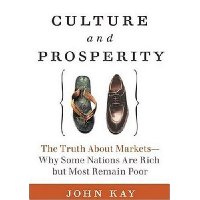| 商家名称 |
信用等级 |
购买信息 |
订购本书 |
|
|
 |
Culture and Prosperity: The Truth About Markets - Why Some Nations Are Rich but |
 |
|
 |
Culture and Prosperity: The Truth About Markets - Why Some Nations Are Rich but |
 |

基本信息·出版社:Collins
·页码:432 页
·出版日期:2004年05月
·ISBN:0060587059
·条形码:9780060587055
·装帧:精装
·开本:20/0开/0开 Pages Per Sheet
·正文语种:英语
·外文书名:文化与繁荣: 为什么穷的国家多
内容简介 在线阅读本书
A witty and accessible tour de force that is immersed in the latest economic thinking, Culture and Prosperity is an indispensable guide to the world around us and destined to become a classic text for understanding the politics of globalization.
Guided by the belief that a combination of lightly regulated capitalism and liberal democracy -- the American business model -- is not just appropriate for America at the dawn of the twenty-first century, but a universal path to freedom and prosperity, the United States is an unrivaled colossus seeking to remake the world in its own image.
After a decade of successive market revolutions around the world, beginning with the collapse of the Berlin Wall and continuing in countries as diverse as Argentina and New Zealand, the effectiveness of the market economy as a route to prosperity and growth is not in question, but a more sophisticated appreciation of the strengths and limits of markets is urgently required.
In this new and illuminating analysis of the nature and evolution of the market economy, John Kay attacks the oversimplified account of its operation, contained in the American business model and favored by politicians and business people. He even questions whether it offers an accurate description of the success of the American economy itself.
In an absorbing argument that rewards close reading, and rereading, Culture and Prosperity examines every assumption we have about economic life from a refreshingly new angle. Taking the reader from the shores of Lake Zurich to the streets of Mumbai, from the flower market of San Remo to the sales rooms at Christie's, John Kay reveals the connection between a nation's social, political, and cultural context and its economic performance.
作者简介 John Kay is one of Britain's leading economists. He has been a professor at the London Business School and the University of Oxford, and is currently a visiting professor at the London School of Economics. He is the only professor of management to receive the academic distinction of Fellowship of the British Academy. A frequent writer, lecturer, and broadcaster, he contributes a weekly column to the Financial Times. He commutes between London, Oxfordshire, and the south of France.
专业书评 From Publishers Weekly Kay, an Oxford economist with a regular column in the Financial Times, tries to follow up on the success of Jared Diamond's Guns, Germs, and Steel, but falls short of the mark (not to mention being perhaps a few years too late). The historical examples used to illustrate basic economic principles lack pizzazz, and hypotheticals meant to reflect contemporary individuals are equally stiff. Kay largely forgoes cultural analysis in order to meticulously define the most fundamental rules of market economies in the sort of dry academic prose that spends as much time announcing the contents of upcoming chapters as it does on dealing with the subject at hand. Eventually, Kay comes around to the suggestion that markets are successful when they are buttressed by strong institutions working together in "disciplined pluralism," but he never quite explains why some cultures are able to achieve and sustain such conditions while others aren't. He also points out that these ideal economic conditions are at some variance with the "American business model" of self-interested players operating with little government interference or taxation, but this is neither a new nor original observation. Though closing chapters do make a compelling argument for the supremacy of microeconomic analysis over sweeping macroeconomic theories, that simply isn't enough to propel the book ahead of better competitors with a long head start.
Copyright ? Reed Business Information, a division of Reed Elsevier Inc. All rights reserved.
From Booklist Kay, a British economist and columnist, offers insight into American economic life in relation to other economies. He contends that rich states, including the U.S., most European countries, Canada, and Japan, are the product of literally centuries of civil society, politics, and economic institutions all evolving together. He cites the lessons learned from the common characteristics of productive economies, which include the evolutionary development of market institutions, the need for these institutions to be integral to the social and political realities of the state, and pluralism (which he defines as the role of open debate and decentralized authority instead of central planning). We also learn what causes different levels of productivity in various countries; the fact that unrestrained greed and opportunism leads to poor countries, not rich ones; why the industrial revolution happened in Britain and not China; and why America is the showcase for capitalism and Russia currently is not. The author cautions, "markets work, but not always and not perfectly." Mary Whaley
Washington Post "[John Kay] ... delightfully ... solves the mystery of why markets work and why they sometimes don’t."
The Independent "One of the leading British economists of his generation…gives answers to those puzzling questions that nag the non-specialist."
Washington Post "[Kay]…delightfully…solves the mystery of why markets work and why they sometimes don't."
London Times "An ambitious and brilliantly executed book... accessible and witty, it sheds light on the way the world works."




